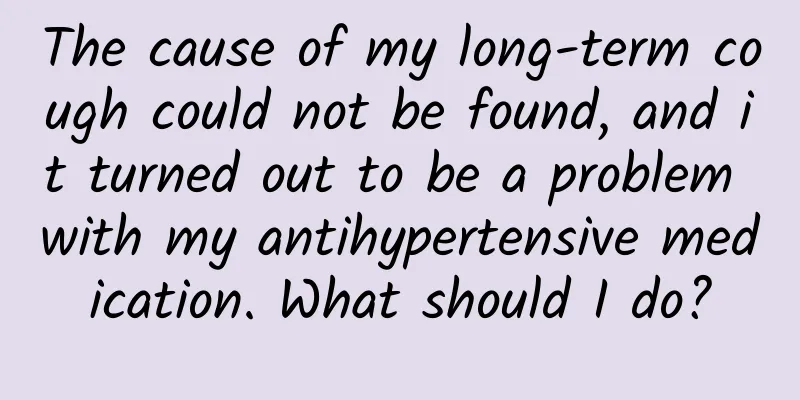The cause of my long-term cough could not be found, and it turned out to be a problem with my antihypertensive medication. What should I do?

|
Huazi helped a friend who had suffered from long-term dry cough to “solve the case”. A friend of mine had a long-term dry cough. At first, he thought he had a cold, but he took cough medicine for a long time and it didn't get better. His stomach was not very good, so when he went to the gastroenterology department, the doctor told him that if he had gastroesophageal reflux disease, gastric acid stimulation would also cause dry cough, so he took proton pump inhibitors for 2 months to inhibit gastric acid secretion, but the cough problem still did not get better. He was worried that he had lung cancer, but a lung CT scan showed that everything was normal. But he accidentally told Huazi that he had high blood pressure and that one of the blood pressure medications he was taking was "pril". Huazi told him that his dry cough was probably caused by this blood pressure medication. Sure enough, after adjusting the medication, his dry cough symptoms gradually disappeared. 1. "Pril" drugs with protective effects on the heart and kidneys are commonly used first-line antihypertensive drugs. Their pharmacological classification is angiotensin converting enzyme inhibitors (ACEI). The mechanism of action is to inhibit the activity of angiotensin converting enzyme, prevent angiotensin 1 from converting to angiotensin 2 with a stronger vasoconstriction effect, thereby blocking a series of biological active effects of angiotensin 2. Pril drugs can also act on the body's bradykinin system, inhibiting bradykinin degradation, increasing the body's bradykinin level, promoting vasodilation, and lowering blood pressure. At the same time, they can improve myocardial cell metabolism, increase myocardial cell energy reserves, and play a cardiovascular protective role. Prils can inhibit the activity of the renin-angiotensin-aldosterone system (RAAS) by inhibiting the activity of angiotensin converting enzyme, which can not only lower blood pressure, but also improve renal blood flow, increase renal blood perfusion, protect the kidneys, and slow down the development of diabetic nephropathy, chronic kidney disease and kidney damage. In terms of cardiovascular disease, pril drugs can reduce cardiovascular events in patients with myocardial infarction and reduce the recurrence of myocardial infarction. They can also reduce the preload and postload of the heart, relieve the symptoms of heart failure, improve the prognosis and development of heart failure, and inhibit ventricular remodeling to protect the heart. 2. Increased bradykinin levels may cause dry cough. Priligy is the only dual-system antihypertensive drug that intervenes in the RAAS and bradykinin systems, and has a significant protective effect on the cardiovascular system. However, when bradykinin levels increase, they will accumulate in the lungs, leading to excessive production of prostaglandins, which will stimulate the nerve endings in the bronchi and cause dry coughs. It will also increase the sensitivity of nerve endings, making the human body more sensitive to cough-causing factors. The side effect of dry cough caused by pril drugs is unrelated to the dosage. It mostly occurs within the first 3 months of taking the drug, with an incidence of about 20%. However, most people have mild cough symptoms and can gradually tolerate it. However, 4% of patients still have severe dry cough and eventually choose to stop taking the drug. 3. What to do after a dry cough occurs If an intolerable dry cough occurs after using pril drugs, stopping the drug is the most effective way to solve the problem. Generally speaking, the cough will be relieved within 1 to 4 weeks after stopping the drug, but some people's cough will not disappear until 3 months after stopping the drug. After stopping pril drugs, sartans can be used instead. Sartan drugs can also inhibit RAAS activity and have a similar antihypertensive effect as pril drugs, but have no effect on the bradykinin system. After stopping the medication, if the condition requires, pril drugs can be used again. For patients who cannot stop taking pril drugs, cough suppressants can be used in combination to relieve cough symptoms. In summary, if a patient with hypertension experiences a dry cough while using pril drugs, it may be a side effect of the drug. Most people have mild symptoms and can tolerate them. If the dry cough is severe, you need to stop taking the drug under the guidance of a doctor and use other antihypertensive drugs instead, or use it in combination with cough suppressants. If you have any questions about medication, please consult a doctor or pharmacist in time. I am pharmacist Huazi. Welcome to follow me and share more health knowledge. |
Recommend
When is the best time to go to Xilin Gol Grassland? Does Xilin Gol Grassland cost money?
Our country is vast and has a variety of terrain....
Infertile women have something very big on their bodies
The causes of female infertility. Clinical studie...
Counterpoint: Global smartphone market to decline 8% year-on-year in Q2 2023
In the second quarter of 2023, global smartphone ...
How to repel mosquitoes and relieve itching during pregnancy
It is not recommended for pregnant women to use p...
What is better to drink for women with kidney deficiency?
As the pace of life quickens, many people feel ph...
Why do women have pain on the right side of their abdomen?
Some female patients have pain on the right side ...
How to reduce breast size
Many people become inferior because of their smal...
Color Doppler ultrasound shows the umbilical cord is around the neck
After a girl becomes pregnant, she must follow th...
When sleep becomes the secret weapon for success, are you one step closer to success?
The recently popular "Frog Princess" Gu...
What are the characteristics of chocolate vesicles?
When it comes to chocolate vesicles, I guess ever...
What to do if you have yeast infection during pregnancy
Mold is a type of bacteria that is widely present...
Precautions and dietary taboos after abortion
Abortion is very painful for women. After abortio...
Autistic girl
There are many symptoms of autistic girls, first ...
What novel is The Bride from the Other Shore based on? Is The Bride from the Other Shore good?
Before the winter and summer holidays every year,...
What should I do if my child wets the bed?
Nocturnal enuresis Definition of Enuresis In my c...









